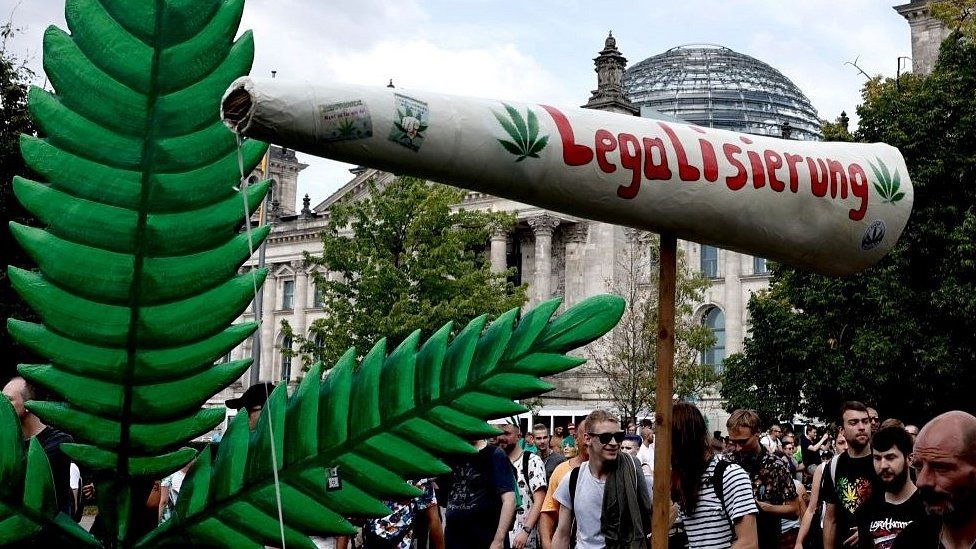On Wednesday, Germany’s Cabinet adopted a plan to liberalise cannabis restrictions, paving the way for the decriminalisation on possession of small amounts and enable members of “cannabis clubs” to purchase the material for recreational uses.
The measure is characterised as the first phase in a two-part strategy, and it still need parliament’s approval. However, the government’s acceptance is an important step forward for a prominent reform project of Chancellor Olaf Scholz’s socially liberal coalition, but it falls far short of its initial goals.
The bill, which the government hopes will go into effect by the end of this year, legalises recreational cannabis possession of up to 25 grammes (almost 1 ounce) and allows individuals to grow up to three plants on their own.
Residents of Germany aged 18 and above would be able to join nonprofit “cannabis clubs” with a limit of 500 members each. The clubs would be permitted to produce cannabis for the personal consumption of their members.
Individuals would be able to purchase up to 25 grammes per day, or a maximum of 50 grammes per month – with under-21s restricted to 30 grammes. It would be illegal to be a member of more than one club. Membership payments would fund the clubs’ costs, which would be tiered based on how much cannabis members use.
The government intends to prohibit advertising or sponsorship of cannabis and clubs, and consumption will be prohibited within 200 metres (656 feet) of schools, playgrounds, and sports facilities, as well as close cannabis club locations.
Officials hope that their scheme would protect consumers from compromised products while also reducing drug-related criminality. According to Health Minister Karl Lauterbach, the method will create “very competitive” prices, “so we think that we can push back the black market well with these rules.”
“We have rising consumption, problematic consumption,” Lauterbach told The Associated Press. “It just couldn’t have gone on like this.”
The center-right opposition claims that the administration is pushing through the legalisation of a dangerous medicine despite European legal impediments and expert advice. According to a German judge’s organisation, the strategy is likely to raise rather than alleviate the burden on the court system and may even stimulate demand for black-market cannabis.
Some legalisation supporters are also dissatisfied.
“What we’re getting from the health minister is overregulation, continued stigmatisation of cannabis users, and a much too tight regulatory corset, which simply makes it impossible for many, many (cannabis clubs) to work,” said Oliver Waack-Jürgensen, founder of Berlin’s High Ground “cannabis social club” founded last year. He also serves on the board of a national organisation that represents such clubs.
Lauterbach dismissed the complaints.
“The fact that it is under attack from both sides is a good sign,” the minister remarked. He went on to say that “approval with much more liberalisation, such as in Holland or some American states, would have led to consumption expanding,” and that those who oppose legalisation “have no answer” to rising consumption, criminality, and a thriving black market.
The legislation will be supported by a campaign to educate young people about the dangers of cannabis use.
According to the government, the new legislation will be followed by a second step: five-year experiments of controlled commercial supply chains in specified locations, which will then be scientifically reviewed.
That falls far short of its original proposal from last year, which called for the sale of cannabis to adults across the country at licenced outlets. Following discussions with the EU’s executive commission, it was trimmed back.
Approaches in other parts of Europe differ. The Netherlands combines decriminalisation with limited market regulation.
The Dutch government allows the sale and consumption of tiny amounts of the substance at so-called coffee shops, but making and selling large amounts of it, which are required to keep the coffee shops stocked, is unlawful. Amsterdam has been cracking down on coffee shops, which have long been a draw for travellers looking to consume marijuana.
Meanwhile, the Dutch government has undertaken an experiment to “determine whether and how controlled cannabis can be legally supplied to coffee shops and what the effects of this would be.”
Authorities in Switzerland approved a pilot project last year that allowed a few hundred people in Basel to buy cannabis from pharmacies for recreational purposes. The Czech government has been working on a scheme similar to Germany’s to enable cannabis sales and recreational use, which is still in the works.
Copenhagen, Denmark’s capital, suggested legalising cannabis, but parliament rejected the proposal. France has no intentions to relax its tight cannabis regulations.
Russia Surpasses Germany to Become Worlds 5th Largest Economy
Russia Surpasses Germany to Become Worlds 5th Largest Economy






